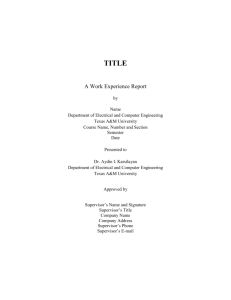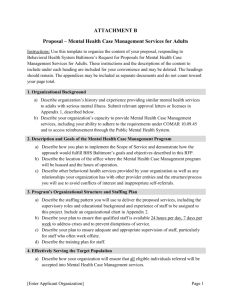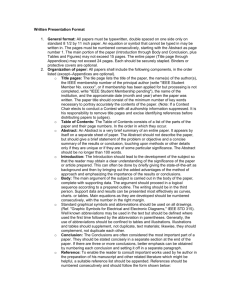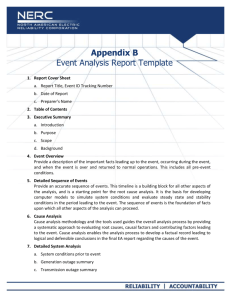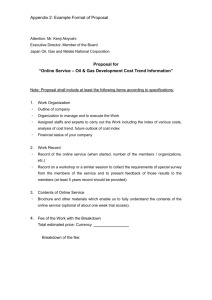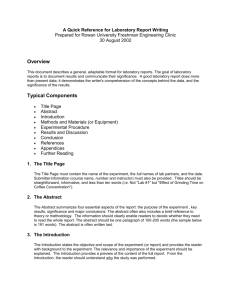Dr. Storrs - Texas Tech University Departments
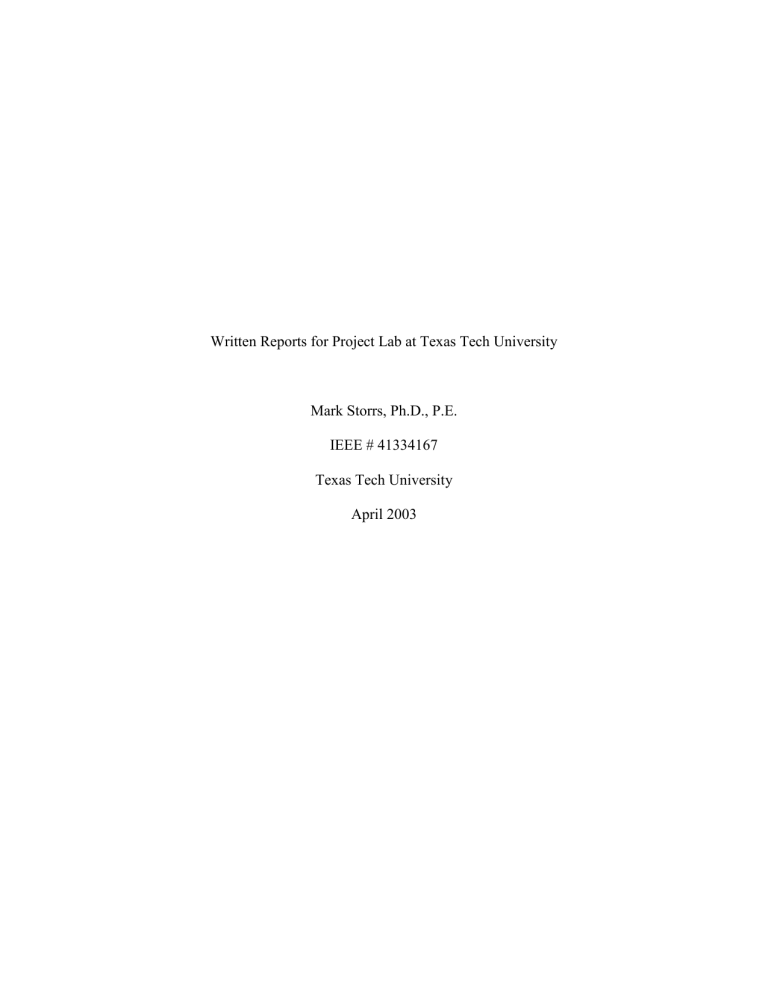
Written Reports for Project Lab at Texas Tech University
Mark Storrs, Ph.D., P.E.
IEEE # 41334167
Texas Tech University
April 2003
Abstract
This paper describes the requirements for written reports in Project Lab courses at
Texas Tech University. The general format for the written reports is described, as well as instructions for specific parts of the paper.
1
Table of Contents
2
List of Figures
Figure 4: Example drawing generated by the Word drawing tool. .................................. 14
3
List of Tables
4
1. Introduction
The technical written report is an essential element in each Project Laboratory course. It should not be an afterthought, hastily prepared at the last moment. Each action the student takes in researching, designing, building and testing the system should be performed with the final documentation of the system in mind.
Each student is required to write an individual report describing the entire system.
It is understandable that an individual student will emphasize his or her own technical contributions; however, each paper is expected to describe the entire system.
The written report is not intended to describe the lab project. The written report is to be a technical description of the system that was designed, built and tested. Do not repeat the project description. Report the technical characteristics and capabilities of the system as it was designed, built and tested. The technical report is not to serve as a journal or as a diary of the design process. Do not report the deliberations of the design group. Do not report the failed attempts and discarded ideas, unless the reader must understand the discarded ideas to understand the system as it was designed, built and tested.
Lab Reports are to be written in compliance with the instructions on the
Departmental web site at http://129.118.19.6/lab/REPORTS.html
. The information shown here is supplementary to those instructions.
2. Audience
The instructions for written reports specify that formal technical papers must comply with the criteria for the IEEE Student Paper Contest [1]. Authors of written
5
reports should consider the audience for their papers to be the managing editor and reviewers of an IEEE journal. In addition, the authors should write in a manner so that other students in Project Laboratory classes can clearly understand the technical material reported in the paper. The authors can assume the readers have a general knowledge of the technical field reported in the paper. Any specialized techniques or vocabulary should be clearly explained in the paper.
3. General Format
All papers must be submitted in electronic form using Microsoft Word . The document shall be double spaced and formatted for standard 8 1/2 by 11 inch paper. The left and right margins shall be 1.25 inches and the top and bottom margins shall be 1 inch. The recommended font is Times New Roman. Use a 12-point type size throughout the document. The pages must be numbered consecutively, starting with the Abstract as page number 1. Locate the page numbers in the bottom margin in the center of the page.
The main portion of the paper (Introduction through Body and Conclusion, plus Tables and Figures) should not exceed 15 pages. The entire paper (Title page through
Appendices) should not exceed 24 pages.
4. Organization
All papers shall include the following components, in the order listed.
Appendices are optional and should be included as required to meets the needs of each individual paper.
6
4.1 Title Page
The title page lists the title of the paper, the name(s) of the author(s), the IEEE membership number of the principal author, the name of the institution, and the approximate date (month and year) when the paper was written. The paper title should consist of the minimum number of key words necessary to portray accurately the contents of the paper. [1] Each paper shall list the names of all group members.
4.2 Abstract
An Abstract is a brief description of the contents of the paper. The purpose of the
Abstract is to help the potential reader decide if he or she wants to read the entire paper.
Since the Abstract is often published separately from the paper, it must appear by itself on a separate sheet of paper. The Abstract should give a brief statement of the technical problem addressed in the paper and a concise summary of the results or conclusion. The abstract should also state the methods and techniques employed in achieving the technical results. The Abstract should be no longer than 100 words.
4.3 Table Of Contents
The paper should be written with numbered sections as shown in this example.
These section numbers must be compiled in The Table of Contents. The Table of
Contents must list the sections in the order that they occur. Also include a Table of
Figures that lists the Figure Captions and the page numbers where the figures appear and a List of Tables that lists the Table Titles and the page where the Table appears.
7
4.4 Introduction
The Introduction to the paper should lead to the development of the subject so that the reader may obtain a clear understanding of the significance of the paper. This can often be done by briefly giving the state-of-the-art as background and then by bringing out the added advantages of the method of approach and emphasizing the importance of the results or conclusions. [1]
4.5 Body
The main argument of the paper is carried out in the Body of the paper, complete with supporting data. The argument should proceed in a logical sequence according to a prepared outline. [1] The paper should be written in the third person. All action in the paper should be ascribed to the system being designed. Do not write in the first or second person. Do not ascribe actions to an individual. Do not use first or second person pronouns. If an action taken by the group must be described, use the passive voice. For example, instead of writing “We measured the voltage at the output,” write, “A measurement of the output voltage was taken.” The paper is describing objects that exist, so write in the past or present tense. Do not write in the future tense unless describing concrete plans for future activity. For example do not write, “The system will work when completed.” It is more acceptable to write, “Spectral analysis will be performed to verify the output of the amplifier.”
The body of the paper should include an overall description of the system using an appropriate block diagram. Each of the components of the system should be described using an appropriate system diagram, circuit schematic or flow chart. Each component of
8
the system should be accompanied by a theoretical, mathematical description or a technical explanation of how the system operates.
Computer code should only be included in the body of the paper if it is central to the discussion. Computer processes should be illustrated with a flowchart accompanied by an appropriate description. Large sections of code should be listed in an appendix.
Measurements are central to the technical written report. The experimental setup of each experiment should be described using an appropriate block diagram and the instruments used in the experiments should be listed. Raw data and the statistical analysis of that data should be included in an appendix. Graphic presentation (charts and graphs) or tables of the analyzed data should be included in the body of the paper. The measured results should be compared to the mathematical model.
Computer processes must also be tested experimentally. Describe the test procedure as well as the input data and the output. Compare the output with the expected results.
If future testing is required, describe the planned experiments in detail and describe those experiments with an appropriate block diagram, instrumentation diagram or flowchart.
4.6 Conclusion
The Conclusion is often considered the most important part of a paper. It should be stated concisely in a separate section at the end of the paper. If there are three or more conclusions, better emphasis can be obtained by numbering each conclusion and setting it off in a separate paragraph. [1]
9
4.7 References
To enable the reader to consult important works used by the author in the preparation of his manuscript and other related literature, a suitable reference list should be appended. References should be numbered consecutively and should follow the form shown in Appendix A. [1] Each item in the list of references must be cited in the text of the paper. The List of References is not a bibliography.
4.8 Appendices
Detailed mathematical proofs, development of equations and examples, which are subordinate to the main argument in the body of the paper but not essential to following the argument, should be treated in appendices. References should be made in the text to details in the appendices. The equations, figures, and tables in the Appendices should be numbered consecutively following the numbers used for the equations, figures and tables in the text (such as, If Table IV were last in the text, Table V would be first in the
Appendices). [1]
Each appendix should include a written narrative describing the contents of the appendix and the significance of the appendix.
Raw experimental data shall be listed in an appendix along with the statistical analysis of that data.
Provide an appendix discussing the safety hazards encountered in designing, building and testing the system. Also discuss the precautions taken to address those
10
hazards. Make note of the maximum voltages encountered in the system and the tools used to build and test the system.
The Project Budget and Gant Chart should appear as separate appendices.
5. Tables and Figures
Support data and results can be presented most effectively as curves, charts, or tables. Include tables in the main body of the text. Each table should be numbered consecutively using Roman numerals: Table I, Table II, etc. Small tabulations or listings may be made in the text where necessary for continuity. Each table should be titled by giving a brief description as a heading following the table number at the top. Table tiles are to be located at the top of the table. Within the table, ditto identical information that appears on several lines. [1] An example table appears below as Table I. The Table
Number and Table Title appear at the top of the table. Tables such as these may be generated using the Table function built into Word , or may be generated using Excel and inserted into the Word document.
11
Table I: Example Table.
Speed Step Data Bits (3-0)
Stop
EStop
Step 1
Step 2
Step 3
Step 4
Step 5
Step 6
Step 7
Step 8
Step 9
Step 10
Step 11
Step 12
Step 13
Step 14
0000
0001
0010
0011
0100
0101
0110
0111
1000
1001
1010
1011
1100
1101
1110
1111
Figures should be numbered consecutively using Arabic numerals: Figure 1;
Figure 2, etc. Each figure must include a caption which fully identifies what is being illustrated, but reading material on an illustration itself should be kept to a minimum.
Portions of illustrations may be identified by letters and explained in the captions.
Whenever feasible, several curves should be combined on the same coordinates. Their identifying letters or numbers should be in clear spaces between cross lines. [1] Include figures in the body of the text. Each table and figure shall be introduced in the text before it appears in the paper. Provide a narrative describing the significance of each figure. The figures may appear as they are introduced in the text. There is no need for figures to appear only at the top of a page. A figure number and caption must follow each figure. Center the figure in the page and break the text above the figure. Resume the text below the figure. Do not wrap the text around the figure. Do not use “floating graphics.” An example figure appears below.
12
Figure 1: Example Oscilloscope Trace.
Charts may also be generated from tabular data using Excel and inserted into the document. Figure 2, shown below, presents an example of such a chart.
20
16
12
8
4
0
0
Model Railroad Power Supply
Peak Voltage
Average Voltage
80 20 40 60
Throttle Setting %
Figure 2: Example Chart.
100
If a figure is taken from another source, the source should be referenced in the
Figure caption. This is illustrated in Figure 3.
13
Figure 3: Example of a Figure taken from another source [2].
Drawings may be generated using the drawing tool built into Word , taking care to avoid floating graphics. An example of such a drawing is shown in Figure 4.
v a
R m i a
L m
v m
J
B
Figure 4: Example drawing generated by the Word drawing tool.
Schematic diagrams may be generated using PSpice and inserted into the document. Please convert the graphics from bitmap to jpg or some other compressed graphics format to minimize the file size. An example of a schematic generated in
PSpice is shown in Figure 5.
14
Figure 5: Example Schematic.
6. Equations
Equations should be numbered consecutively, with the equation number at the right margin. Mathematical equations shall be displayed using the “Equation Editor” in
Microsoft Word . Mathematical equations shall be formatted using italics for variables and normal typeface for functions. Use the “Symbol” font for Greek letters. Equations should be set off from the text of the paper by a space. The equations should be read and punctuated as a part of the sentence. For example, the definition of the Fourier transform is
X ( f )
f ( t ) exp(
j 2
ft ) dt . (1)
7. Plagiarism and Intellectual Honesty
Each student is to write an individual report. Each report is to reflect the understanding of its author. Plagiarism will not be tolerated. Five or more identical
15
consecutive words in two reports is considered prima facie evidence of plagiarism and will result in, at the very least, a grade of zero for both papers. Plagiarism is grounds for failure of the course and dismissal from the University. Each student must take care to use material provided by a teammate properly in order to guard the reputation of his or her teammate. Take care to reference tables and figures taken from other sources properly.
8. Evaluation
The form used for evaluating the written reports is shown in Appendix B. Pay special attention to the results presented in the paper and the measurements reported in the paper.
9. Uploading Papers
Upload the paper to the appropriate folder on Moodle. Use the filename
Lastname_Preliminary_Report.doc
. The papers will be downloaded for review. An electronic copy of the paper, with comments, will be uploaded. Each author will consider the comments and incorporate them in a manner appropriate to the comment.
16
References
1. Department of Electrical and Computer Engineering, Texas Tech University.
“Electrical Engineering Written Report Formats,” http://129.118.19.6/lab/REPORTS.html
, September 25, 2001.
2. Brandt, Michael. “The DCC – MB Homepage”, 1996, http://web.syr.edu/~mobrandt/dcc-mb/dccmbhom.htm
, September 26, 2001.
17
Appendix A
Reference Forms
Use the following forms for citing references:
For a periodical:
1. R.M. Hall, "Power Rectifiers and Transformers," Proc. IRE , Vol. 40 pp, 1512-1518,
November 1952.
For a book:
2. W.A. Edson, Vacuum Tube Oscillators , John Wiley and Sons, Inc., New York, New
York, pp. 170-171, 1948.
For an article:
3. B. Lawrence, B.H. Well, and M.H. Graham, "Making on-line search available in an industrial research environment," Journal of the American Society for Information
Science , pp. 364-369, Nov. - Dec. 1974.
For a website:
4. Author’s Last Name, First Name. “Title of the web site,” Date Month Year of
Publication <URL> (Date accessed).
Example:
5. Smith, John. “Electronic Circuits for Everyone,” 15 March 2000, www.myfavoritecircuits.com (1 May 2001)
For an unpublished lab paper:
6. Author’s Last Name, First Name. “Title of the paper.” Lab Report, Educational
Institution, Date Month Year
Example:
7. Smith John. “Magnetic Levitation,” Lab Report, Texas Tech University, 15 March
2001.
For information provided by a teammate:
8. Last Name, First Name. Form of communication, Date Month year.
18
Examples:
9. Smith, John. Laboratory Notes, 15 March 2001.
10. Smith, John. E-mail to author, 15 March 2001.
11. Smith, John. Personal interview, 15 March 2001.
For information from a lecture course:
12. Last Name, First Name. “Title of Course.” Educational Institution. Semester Date.
Example:
13. Smith, John. “Digital Design Using Microcontrollers.” Texas Tech University. Fall
2000.
For information from an advisor meeting:
14. Last Name, First Name. Form of communication, Date Month Year.
Example:
15. Smith, John Ph.D. Personal Interview, 15 March 2001.
19
Appendix B
WRITTEN LAB REPORT EVALUATION FORM
Student Name: Course Number:
Please score the student by circling one of the responses following each of the statements.
1) The student's writing style (clarity, directness, grammar, spelling, style, format, etc)
A B C D F Zero
2) The quality and level of technical content of the student's report
A B C D F
3) The quality of results and conclusions
Zero
A B C D F
4) Quality of measurements planned/ taken
Zero
A B C D F Zero
Grade:
20
